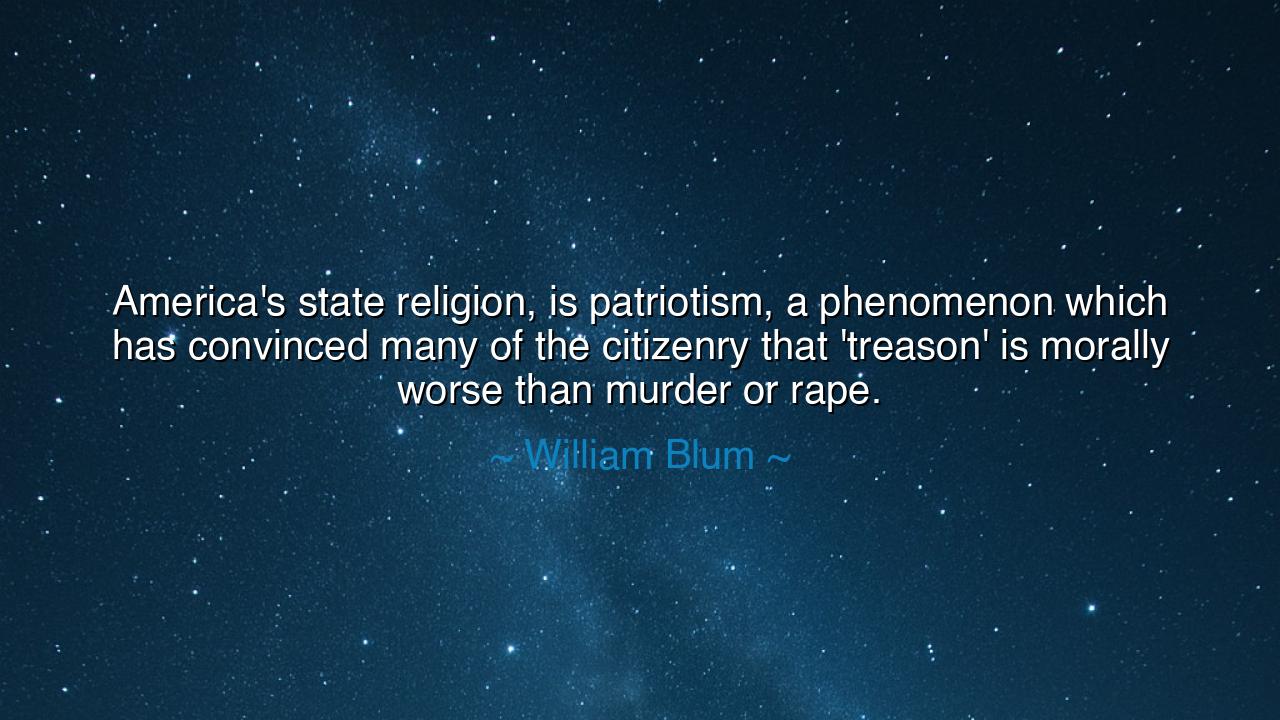
America's state religion, is patriotism, a phenomenon which has
America's state religion, is patriotism, a phenomenon which has convinced many of the citizenry that 'treason' is morally worse than murder or rape.






William Blum, sharp of tongue and unafraid of thundering against false altars, declared: “America's state religion, is patriotism, a phenomenon which has convinced many of the citizenry that 'treason' is morally worse than murder or rape.” In these words lies a warning as old as empires: that when patriotism rises from love of country into worship of the state, it ceases to be a virtue and becomes an idol. What should inspire loyalty and service hardens into dogma, and what should guide the heart toward justice instead blinds the eyes to truth.
The ancients knew this danger well. Rome demanded worship of the emperor, branding those who refused as traitors, worse than murderers or thieves. To be guilty of treason was not simply to disobey the state, but to challenge the very godhood of Caesar. And so martyrs were slain, not for crimes of violence, but for refusing to bend the knee to an empire that exalted itself as divine. Blum’s words remind us that in modern times, the same spirit lives on, cloaked not in the name of gods, but in the fiery rhetoric of patriotism.
History bears grim testimony to this. In the early days of America, dissenters to war were branded as traitors, scorned as worse than criminals. During World War I, the Espionage Act punished those who questioned the conflict, their voices silenced as though they had committed the blackest of sins. The irony was clear: one might take a life and still find mercy, but to question the sanctity of the nation’s cause was deemed unforgivable. Thus did patriotism as religion twist the moral compass, placing loyalty to the flag above loyalty to truth, justice, or compassion.
And yet, the love of country is not in itself evil. True patriotism is the devotion of a people to the land, to their neighbors, to the ideals that give life to the community. It becomes dangerous only when it eclipses conscience, when it demands worship instead of service. Blum’s words remind us that the exaltation of state over humanity leads to the corruption of the soul, where one may excuse cruelty as long as it is done in the name of the nation, while condemning dissent as the greatest of evils.
Consider the fate of Socrates, accused of corrupting the youth and dishonoring Athens. His true crime was questioning the false gods of the city, calling men back to reason and truth. To the people, this was worse than any ordinary crime, for it shook the foundation of their civic faith. He was sentenced to death, and in his cup of hemlock we see the same truth that Blum reveals: when loyalty to state or tradition is treated as sacred, treason—even the treason of honest questioning—becomes the ultimate sin.
The lesson is clear: beware when patriotism is treated as religion, for religion, when twisted, demands sacrifice. A nation may demand the blood of its soldiers, the silence of its critics, and the obedience of its citizens, all in the name of sacred loyalty. But the true measure of morality is not obedience to the state, but fidelity to justice, compassion, and truth. Treason against injustice is no sin; it is the seed of liberty.
Practical actions are within reach. Question the slogans that demand blind allegiance. Ask not only, Is this loyal? but, Is this just? Do not despise your homeland, but love it with the love of one who dares to correct it. Honor your flag, but honor more deeply the lives and freedoms of your neighbors. And when accused of disloyalty for speaking truth, remember that silence in the face of injustice is itself a betrayal—betrayal not only of country, but of humanity.
O seeker, remember Blum’s wisdom: patriotism as religion can blind a people, making them fear dissent more than cruelty, and label treason worse than bloodshed. But true loyalty is not worship of the state—it is the courage to demand that the state remain worthy of loyalty. Therefore, love your country as you love a friend: not blindly, but honestly, calling it higher, urging it toward justice. For in this way, patriotism becomes not an idol, but a force for truth, and treason becomes not a crime, but sometimes the noblest of virtues.






AAdministratorAdministrator
Welcome, honored guests. Please leave a comment, we will respond soon